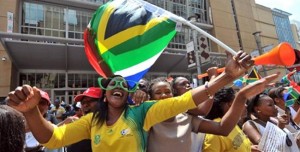Racial reconciliation and the World Cup
JOHANNESBURG — Seeing South Africa’s FIFA World Cup stadiums throb with fans of numerous nationalities makes it hard to imagine that sports in this country were once systematically divided along racial lines.
While apartheid’s demise in 1994 led to little immediate change among fans — whites still tend to favour rugby and cricket, while soccer remains a largely black sport — the almost tribal lines dividing sports are fading.![]()
Here is the Music Player. You need to installl flash player to show this cool thing!
Whites have come out in support of South Africa’s national team, nicknamed Bafana Bafana, and with the team’s early exit from the World Cup, black and white fans alike don their bright yellow jerseys to see the 16 surviving teams.
Bars and pubs, once the haunts of either a black or a white crowd, now are brimming with both.
At the Radium Beer Hall — one of Johannesburg’s oldest — the TV screens have been switched over from rugby to soccer, which white customers have come to embrace – or accept.
“They do watch it on our TV screens, and when Bafana Bafana is playing, most of the white people they come and support them,” said bartender Alfred Skhosana. “That wasn’t happening before. We are united now.”
Miguel Cabeleira is among a growing number of white players on South Africa’s soccer clubs.
“We grew up in South Africa with the apartheid system, where matches were segregated,” he said. “So you watched your games in your area, and areas were either white or black. You never had that mix like we have now.”
Local pub-goer Jean Elliot says his watering holes are also changing. “People seem to put aside their differences,” he said. “And I think what was interesting was the rugby being played in Soweto. That was a sort of turning point.”
History in the making
Before the World Cup began, FIFA took over Pretoria’s rugby grounds, moving the rugby semifinals to Orlando Stadium in Soweto — a predominantly black area — for the first time.
“This is actually history in the making now,” said John Brazier, who watched his beloved Blue Bulls play at Orlando. Showcasing a sport loved by whites in a black area, he says, will have implications beyond the pitch.
“It’s the first time, I think, that Soweto sees so many white people in here. It’s my first time in Soweto. It’s a good vibe, it’s good for the country.”
Anthea Jeffrey, head of special research at the South African Institute of Race Relations, says this could be part of a broader trend. Surveys in the 2000s found fewer violent racist attacks and other forms of direct racism.
“These surveys have confirmed that race relations are improving and that racial violence is rare,” said Jeffrey, author of Chasing the Rainbow, South Africa’s Move from Mandela to Zuma.
“I think the upsurge in feeling now is an exciting thing and does have parallels with what happened when [Nelson] Mandela was released and when he became president, when there was tremendous feeling that we could at last put the past behind us, that we could build a brave new world.”
What has endured, though, is the deep and widespread poverty of millions of South Africans, in close proximity to rising wealth. While racial discord has diminished, the chasm is widening between a modest number of blacks entering the middle class and the majority that remain poor.
Good vibes short-lived?
This is why some say the current unity among South Africans will be short-lived and the World Cup is at best a distraction.
“The vast majority of whites will go home to rich northern suburbs and the vast majority of blacks — those that can afford the tickets, which are very few — will go back to the poor townships,” says writer and activist Dale McKinley.
He fears the “service-delivery riots” that spread throughout townships deprived of housing, clean water and electricity will erupt all over again.
Anthea Jeffrey agrees.
“One does fear that after all the excitement has worn off, there will be a sort of hangover,” she says.
“If the economy doesn’t get a boost, then we come back to the harsh reality, that unemployment is very high, that there’s a small elite that is doing well — black and white — but a vast underclass which is doing badly and which is getting impatient for the better life that’s been promised since 1994.”
Back at the pub, where Chile battles Brazil on seven TV screens, owner Manny Cabeleira is confident that soccer will help unite South Africans, as the country’s Rugby World Cup victory did in 1995. Then, newly elected Mandela donned the Springbok jersey, sending the signal that he would work to reconcile the races, rather than avenge decades of apartheid.
“It gave everybody a look into the future of what South Africa can be and should be,” says Cabeleira. “What rugby did for the country, soccer is going to do for the country now.”
Hosting a FIFA World Cup tournament, however, is not the same as winning it. And after 16 years of African National Congress government, the patience of poor South Africans may be wearing thin.
When the final whistle is blown and the foreign fans go home, World Cup euphoria could well mutate into a very different sentiment indeed.
This article has a music clip racnsportsouthafrica.mp3


